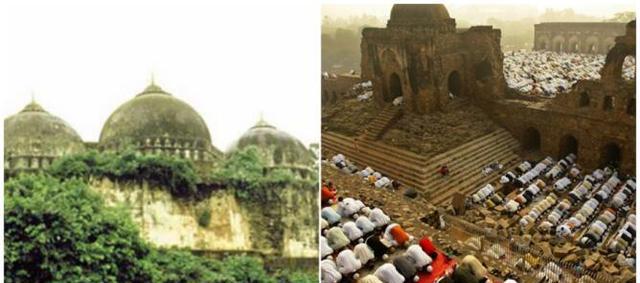On November 9, India's Supreme Court ruled that 27 years ago Hindus were not guilty of destroying a mosque in the northern Indian town of Ayodhya, causing a large number of casualties. Hindus will be allowed to build a Hindu temple at this site, while Muslims will be given another piece of land for the restoration of the mosque. In response to the verdict, The Indian Muslim community has expressed great disappointment and will submit a petition for review while continuing to fight. After the Modi government came to power, Hindu nationalist sentiment was high, and it was expected that Indian courts would make judgments in favor of Hindus, and they dared to make such a judgment at this time, and they must also be prepared to bear the impact of possible chaos in the local order.

Babri Mosque
<h1>1, the location is very sensitive</h1>
Just as Islam, Christianity, and Judaism all see Jerusalem as a holy place, there are many in India who see Ayodhya in Uttar Pradesh as a religious holy place. In the late period of British colonial rule, Ayodhya had built 96 Hindu temples and 36 mosques. The mosque, called Babri, was built in 1528, but Hindus believe that the mosque is located in the birthplace of the Hindu god Ramayana, the mosque built by later Muslims who destroyed Hindu holy sites.
In 1992, Hindu extremists destroyed the Babri Mosque, triggering massive religious clashes across India that killed more than 2,000 people. For years, the Indian government, for fear of triggering a new religious conflict, has been reluctant to make a decision on whether the site of the Babri Mosque belongs to Hindus or Muslims, deliberately using a lengthy judicial process to dampen the hostility between Hindus and Muslims.
<h1>2. The controversy remains unresolved</h1>
Hindus insist that the location of the Babri Mosque is the birthplace of the gods and has historically been a holy site for Hinduism, and there is plenty of archaeological evidence to support this, so it is absolutely impossible to give up. The Muslim Religious Foundation of India pointed out that the Babri Mosque had been operating continuously since 1528, and it was not until 1949, after India's independence, that local officials joined hands with Hindus to bury the baby statue of Ramayana behind the temple, creating the illusion that it was a Hindu holy place.
Now it is not a question of who should build one more temple, but rather that both sides insist on building a temple on the site of the Babri Mosque, so the Indian court's decision, which seems fair, is actually completely on the side of the Hindus. Coupled with the large number of casualties caused by the conflict between the two sides in 1992, neither side had the courage to take the initiative to retreat. It is conceivable that in the process of building Hindu temples, new large-scale conflicts may break out on both sides at any time.
<h1>3. Why was the judgment made at this time? </h1>
After the outbreak of the Babri Mosque conflict in 1992, successive Indian governments have adopted a "peace and mud" approach, because no one can make a perfect decision on religious and historical issues. The reason why the Modi government wants to break with tradition and completely resolve the Babri Mosque controversy is both historical and practical considerations.
The 1992 Babri Mosque conflict was caused by a seditious speech by Modi's Bharatiya Janata Party in Uttar Pradesh, India, encouraging Hindu extremists to demolish the mosque. In this year's Election campaign for India's parliamentary elections, Modi and the People's Party have made another pledge that once elected they will completely resolve the historical dispute over the Babri Mosque. Now that India's Supreme Court has made this decision, which is completely anti-Hindu, it is also an action by Modi to solve historical problems and fulfill his campaign promises.
From a realistic point of view, Modi's Bharatiya Janata Party is itself a political party with strong religious and populist colors. In order to divert the dissatisfaction of the Indian people, Modi and the People's Party can only start on religious issues to divert the attention of the Indian people and consolidate the basic support plate. Previously, the Modi government revoked the autonomous status of indian-controlled Kashmir and strengthened the control of the local area, in fact, it is the same effect as the judgment on the Babri Mosque.
Manipulating religious disputes is a very dangerous move, India's famous cultural heritage Taj Mahal, is also a typical Islamic style architecture, will the future Hindus also want to destroy it? India is a multi-religious country, with Muslims making up only 14% of India's population, but also nearly 200 million. The Modi government has continuously challenged the endurance of Indian Muslims on the issue of kashmir autonomy and the Babri Mosque, and once there is a serious religious conflict in India, India's already fragile national economy will also fall into the abyss.
Thanks for reading, welcome to review and keep an eye on it!